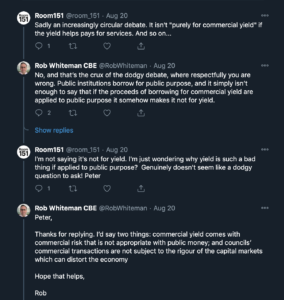 The future lending terms for local government borrowing has become a sensitive topic. Room151.co.uk brought experts together to explore the issue.
The future lending terms for local government borrowing has become a sensitive topic. Room151.co.uk brought experts together to explore the issue.
The debate over councils borrowing from PWLB for commercial investment rumbles on. Even as finance chiefs across England await the results of a government consultation, the discussion simmers aways.
In a recent Room151.co.uk webcast CIPFA’s associate director Andrew Burns defended the institute’s stance that borrowing from the PWLB could not be yield only, even if the income is spent on essential services. Borrowing for yield risked forcing central government to withdraw the guidelines which allow councils to invest without asking permission.
The webcast debate followed a Twitter exchange between Room151 and CIPFA chief executive Rob Whiteman over the appropriate use of money borrowed from PWLB. Whiteman described exchanges over “borrowing for yield” as a “dodgy debate”
Meanwhile, finance chiefs cautioned that cuts in central government funding had forced local authorities into new ways of raising funds and any new guidelines on borrowing should allow councils to invest in their “economic areas”, not just within their administrative boundaries.
12th Local Authority Treasurers Investment Forum & FDs’ Summit
NOW A VIRTUAL EVENT + ZOOM151 Networking
Jan 21, 22 & 23, 2021
The discussion highlighted just contentious and nuanced the issued of local government borrowing can be. But finance officers are likely to see some form of tightening of the rules.
During the Room151 debate Andrew Burns described local government’s ability to borrow for commercial investment as a “huge prize”, and said it should it should be put at risk by councils investing for any other purpose than “regeneration or place shaping”.
“CIPFA are very supportive of local decision making,” said Burns, “and would want to keep the ability for councils to borrow from PWLB, but if we could focus that on regeneration, placeshaping developing services.
He added: “But I think at its heart, the reasons CIPFA have come out strongly against borrowing for yield only is because that’s taking risks with public money, which should be used for public purpose, not organisational commercial risk and it’s as simple as that.”
Consultation on borrowing from PWLB ran from March until the end of July this year.
It followed a National Audit Office report that raised concerns about the level of borrowing undertaken by local authorities for investment in commercial property. The report found that between2016 and 2019 local authorities has spent £6.6bn on commercial property but 80% of that spend was by 49 out of 352 councils in England.
The study also found that 38% of commercial property bought by councils was outside their boundaries.
Controversy around borrowing was further fuelled in October last year when PWLB rates were raised 100 basis points by HM Treasury in response to increased borrowing.
Room151’s Monthly Online Treasury Briefing
November 27th, 2020
Money market funds and deposit accounts
Register here with a .gov.uk email address
Andrew Hardingham, head of finance at Plymouth City Council, said he believed some councils had been forced down the route of investing for a return to continue funding services after seeing their revenue support grants substantially reduced during the period of austerity from 2010.
His own council, he said, invested in commercial property but in the context of the authority’s local plan.
But he added: “I’m not going pull the wool over people’s eyes, the acquisition of properties is in the context of the local plan, but also in the context that while we are undergoing the transformation, the regeneration of the city, those assets will actually earn some sort of return and some sort of income for us.”
Further nuance was added to the debate by Nikki Bishop, finance chief at Trafford Council in Greater Manchester, who warned that any new guidelines should avoid being overly prescriptive on where councils can invest to achieve their “placemaking”.
She gave the example of Trafford owning a share in Manchester airport, outside the council’s own boundaries but nonetheless important to its resident economic prospects.
Bishop acknowledged that current guidelines in the Prudential Code did not restrict investment within a council’s immediate boundaries, but she added: “It would be very artificial if you said you have to invest only in your own area.” New guidance, she said, would need to be careful in what it means by regeneration in an “economic area”.
Meanwhile, David Green, strategic director at Arlingclose, argued that CIPFA and the government would have to address key definitions that frame illegitimate borrowing. The Prudential Code says borrowing “in advance of need” is ruled out. But Green argues if the “need” in question is cash for spending on services, it’s difficult to see how the definition provides clarity. Andrew Burns conceded the wording may need clarification.
The results of the PWLB consultation are yet to be published. In the meantime the debate is likely to continue.
To see the full discussion go to the Room151 webcast here.
FREE monthly newsletters
Subscribe to Room151 Newsletters
Monthly Online Treasury Briefing
Sign up here with a .gov.uk email address
Room151 Webinars
Visit the Room151 channel














